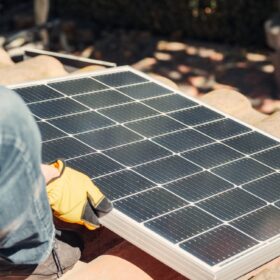New environmental, social and governance obligations for solar and storage
As renewable energy deployment accelerates, the industry falls under an intensifying spotlight. Developers and financiers face mounting pressure to prove credible environmental, social and governance (ESG) compliance across the solar and battery storage value chains.
Improving solar inverter design with silicones
Inverters must withstand the high levels of heat generated when operating, otherwise system performance and reliability could be at risk. Cody Schoener of Dow Performance Silicones argues using silicone-based materials for inverters can improve thermal management and fire protection, while offering thermal stability, environmental resistance, electrical isolation and support for operational efficiency.
Why small-scale, non-utility solar is important
Behind-the-meter solar for homes, businesses, and communities comes with numerous benefits, said a paper from Stanford engineering professor Mark Jacobson.
Construction begins on 150 MW Bee Hollow solar project in Illinois
The utility-scale solar project is expected to contribute $17 million in tax revenues over the first 20 years of operations while adding enough renewable energy to power approximately 45,600 homes per year.
“Procure with haste” as solar power purchase agreement prices rise, says LevelTen Energy
U.S. solar power purchase agreement prices rose 4% quarter-over-quarter in Q3 2025, and prices may continue to increase for “months and years to come,” said a report from PPA marketplace operator LevelTen Energy.
Global PV outlook clouded by policy shifts and China export risks
The global PV market faces uncertainty amid fluctuating module prices and evolving energy policies. Changes to Chinese export taxes may further raise module costs, affecting European and Asian markets.
New standard for U.S. Customs solar supply chain compliance
To help importers vet compliance with the Uyghur Forced Labor Prevention Act and other supply chain traceability requirements, the Solar Energy Industries Association released the Standard 101, which was recently approved by the American National Standards Institute.
T1 Energy acquires minority stake in Talon PV in Texas solar manufacturing push
T1 Energy made a strategic investment in the company that is pursuing 4.8 GW of solar cell manufacturing in the United States.
Trump administration cancels largest solar project in United States
The Bureau of Land Management has officially cancelled the Esmeralda 7 solar project, a Nevada-based project that would stand among the world’s largest solar power plants, large enough to power nearly 2 million homes.
U.S. solar and energy storage businesses secure near $1 billion in flurry of deals
Nexamp, Energy Vault, Generate Capital and NineDot Energy all announced major transactions to infuse more capital in their businesses.
















